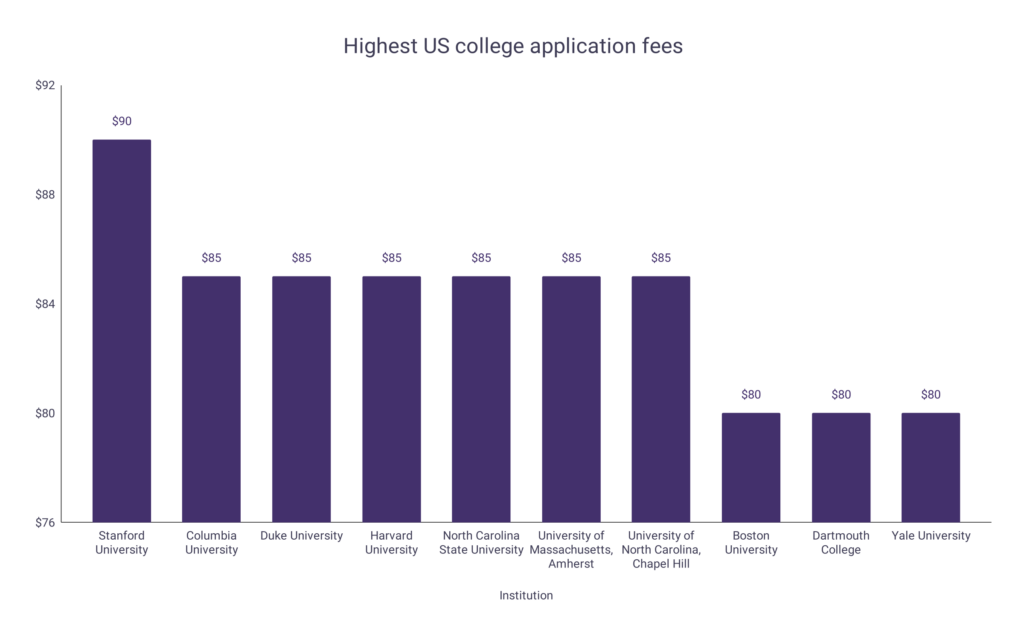Fees charged to students for college applications are relatively low when compared to the overall cost of higher education. However, students are encouraged to make non-refundable applications for 4 – 8 institutions before the start of their freshman year, amounting to a larger total cost.
- As of the 2022/23 academic year, the average US college application fee is estimated at $45.
- This amounts to an estimated 0.13% of the total average college fees for first-year US undergraduates.
- In general, college application fees are estimated to range between $30 – $90 for standard programs.
- Applying to 4 US colleges costs an estimated $180 in application fees per student.
- Applying to 6 US colleges costs an estimated $270 in application fees per student.
- Applying to 8 US colleges costs an estimated $360 in application fees per student.
- However, accounting for additional costs such as testing, tutoring and travel, a student could be expected to pay an estimated $2,250 for a total of 5 college applications.
- Application fees are frequently higher at Ivy League and other US private colleges.
- In special circumstances, fee-waivers can be offered to students based on need and/or merit.
- There are also some US colleges that do not charge application fees (often religious colleges, liberal arts colleges and online colleges).
Additional costs of college applications
In addition to the direct cost of college application fees, there are also a range of supplementary costs which need to be taken into consideration by students.
- With fees plus additional costs, a student could be expected to pay an estimated $2,250 for 5 college applications in total. This could include:
- SAT test fees (approximately $55).
- ACT test fees (approximately $85).
- Courses/tuition for standardized testing or tutoring.
- Fees for changing the testing site of a standardized test.
- Fees for late registration of a college application or test.
- Fees for cancellation of a test.
- Travel expenses when visiting schools, attending test sites and interviews.
- Fees for the retrieval of high school transcripts (can be higher if using a third-party service provider).
- Additional costs associated with preparation for tests.
Reducing costs of college applications
Many students are able to benefit from a number of schemes to help reduce the overall cost of applying to college.
- Colleges without fees: Most US states have at least one no-fee college in order to make higher education accessible to students with smaller budgets.
- Fee waivers: Many colleges do not want to prevent the applications of good students and can offer fee waivers (often based on need or merit) in special circumstances.
- Fee-free periods: Fee-free periods are offered by many public colleges to provide a limited period to apply without application fees (usually during Sep/Oct for up to 1 month).
- Online applications: As online applications are more convenient to the college admissions office, colleges can offer reduced or free applications if a student applies digitally.
- Reduced applications: Fees can significantly increase by making many college applications.
- By focusing on a reduced number of applications that provide a better fit for the student, fees can be reduced greatly.
- Reduce unneeded services: It can appeal to students to pay for school transcripts and tutoring but this may not affect their chance of admission into a higher rated college.
- Cheaper options are often available, such as free school transcripts (depending on availability) or group tutoring sessions.
US colleges with highest application fees
Application fees are commonly higher at Ivy League and other private colleges when compared to public US institutions.
- As of the 2022/23 academic year, Stanford University has the highest application fees for standard US college programs at $90.
- This is double the national average.
- The top 10 most expensive colleges for application fees have fees ranging from $80 – $90 per application.
- Private universities make up 70% of the top 10 most expensive universities for application fees.
- Ivy League universities make up 40% of the top 10 most expensive universities for application fees.
| # | College | Private? | Ivy League? | Application fee |
| 1 | Stanford University | Yes | No | $90 |
| 2 | Columbia University | Yes | Yes | $85 |
| Duke University | Yes | No | $85 | |
| Harvard University | Yes | Yes | $85 | |
| North Carolina State University | No | No | $85 | |
| University of Massachusetts, Amherst | No | No | $85 | |
| University of North Carolina, Chapel Hill | No | No | $85 | |
| 3 | Boston University | Yes | No | $80 |
| Dartmouth College | Yes | Yes | $80 | |
| Yale University | Yes | Yes | $80 |
A graph is given below to compare the US colleges with the highest application fees:

College application fees FAQ
Why are applications to college so expensive?
- Higher application fees prevent students from making many applications and creating large amounts of work for college admissions departments.
- Instead, students are encouraged to think more carefully about the institutions that they wish to apply to, knowing that they will receive higher charges for their applications.
Do I still have to pay for application fees if I am rejected?
- Application fees go towards the costs of processing each application regardless of whether it is rejected or not.
- Due to this, students will not be refunded if they are rejected for a place that they apply for.
When do you have to pay college application fees?
- College application fees are usually paid upfront when a student makes their application.
How many students don’t go to college due to application fees?
- Latest figures show that up to 25% of highly academic students with a low income family do not apply to college.
- Many of these students do not apply due to the cost of application fees alone.
- Students from underprivileged backgrounds often find themselves limited to just one college application or not being able to apply at all.
How to waive college application fees
- There are a number of methods students can use to waive the fees associated with applying to college:
- Asking the college directly for a fee waiver or applying to colleges that do not charge application fees are common methods to reduce costs.
- In addition, students can reduce application fees by:
- Applying for the Common App fee waiver which applies to over 1,000 participating institutions.
- Applying for the Coalition App fee waiver which applies to 125 participating institutions.
- Applying for the NACAC application fee waiver.
- Qualifying for SAT or ACT waiver status.

